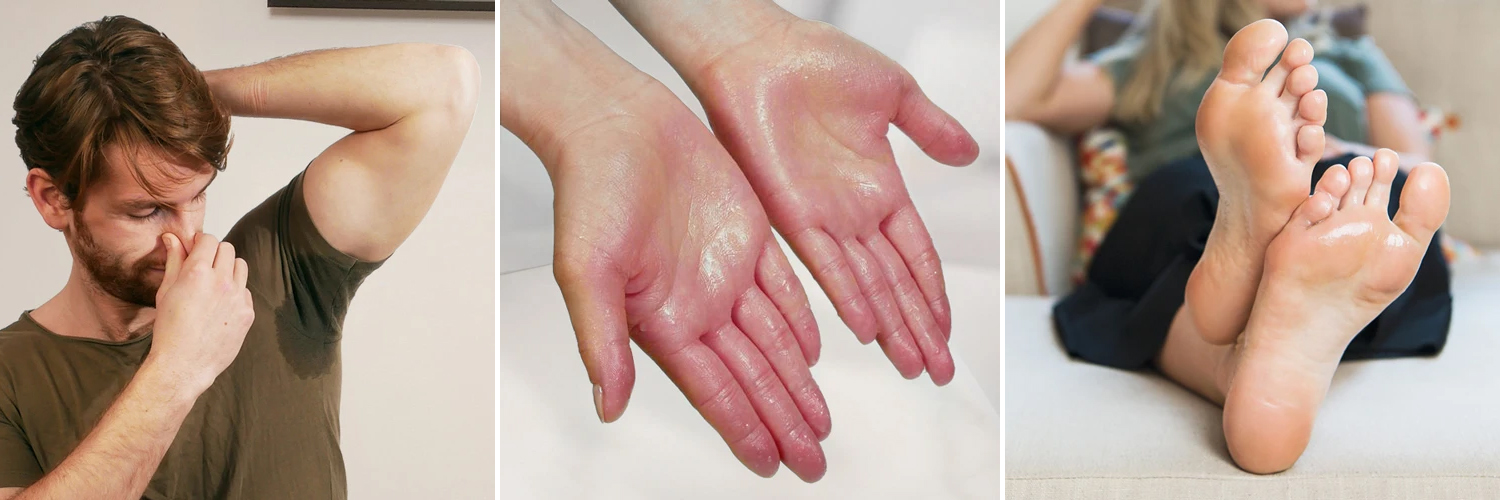Targeted Dermatology Treatments for Hyperhydrosis of Hands and Feet: Efficient Solutions
Targeted Dermatology Treatments for Hyperhydrosis of Hands and Feet: Efficient Solutions
Blog Article
Comprehending the Origin of Excessive Sweating and Its Influence On Day-to-day Live
Excessive sweating, likewise recognized as hyperhidrosis, is a condition that impacts a substantial section of the population, yet its hidden reasons and implications on everyday working continue to be rather enigmatic. While it is commonly understood as a physiological feedback to regulate body temperature, the triggers for extreme sweating can differ extensively amongst people, encompassing not only physical variables yet psychological and likewise emotional aspects. The effect of this problem prolongs beyond simple discomfort, typically influencing social interactions and total top quality of life. By diving right into the origin triggers of hyperhidrosis and exploring its diverse effects, a deeper understanding of this pervasive issue can be obtained, clarifying the complexities that people facing too much sweating browse each day.
Physiology of Sweat Glands
The regulation of sweat production, an essential physical process, is largely controlled by the task of sweat glands dispersed across the human body. Sweat glands are classified right into two primary kinds: eccrine and apocrine glands.
When the body temperature level increases, either as a result of exercise, heats, or emotional anxiety, the nerve system sets off the gland to generate sweat. This sweat is composed largely of water and electrolytes like sodium and chloride. The process of sweat manufacturing is essential for preserving the body's interior temperature level within a narrow, optimal variety, highlighting the critical role sweat glands play in human physiology.
Triggers for Excessive Sweating
In recognizing the source of extreme sweating, it is vital to recognize the triggers that can lead to this physiological reaction. Extreme sweating, additionally recognized as hyperhidrosis, can be prompted by various factors, both environmental and physiological. One typical trigger is emotional anxiety or anxiousness, which can boost the body's gland to create even more sweat than is needed for cooling down. Physical physical effort, heats, and spicy foods are also understood to trigger extreme sweating in people vulnerable to this condition. Specific medical problems like diabetic issues, hyperthyroidism, or menopause can add to extreme sweating as well.
Furthermore, drugs such as some antidepressants, opioids, and specific supplements can likewise function as triggers for hyperhidrosis. Comprehending these triggers is important in taking care of extreme sweating effectively - Exessive Sweating. By determining and dealing with the details triggers that motivate extreme sweating in an individual, medical care carriers can establish tailored treatment strategies to reduce this problem and improve the person's lifestyle
Medical Conditions Associated
Linked with excessive sweating are different clinical conditions that can worsen this physical action. One common condition is hyperhidrosis, a problem characterized by unusually boosted sweating that goes beyond the body's thermoregulatory needs. This can materialize in focal locations like the palms, soles, underarms, or face, affecting a person's lifestyle due to social humiliation and pain.
Additionally, endocrine disorders such as hyperthyroidism, diabetes, and menopausal hot flashes can additionally lead to too much sweating. Hyperthyroidism triggers an overproduction of thyroid hormones, increasing metabolic rate and setting off sweating.
Furthermore, infections like endocarditis, tuberculosis, and hiv have been connected with evening sweats, a typical signs and symptom understood to interrupt rest and impact overall health. These medical conditions highlight the varied series of underlying factors that can add to excessive sweating, demanding complete analysis and monitoring by health care professionals.
Emotional and psychological Aspects

Effect On Social Communications
Excessive sweating can have extensive effects on a person's ability to engage pleasantly in social interactions. The noticeable signs of sweat spots or damp patches on garments can lead to humiliation and self-consciousness, creating individuals to withdraw from social scenarios. This withdrawal can impact connections, restriction social activities, and impede expert and individual development.

Moreover, the anxiousness and self-esteem problems originating from too much sweating can affect communication and interpersonal skills. Individuals may have a hard time to concentrate on discussions, join team tasks, or share themselves with confidence. This can lead to feelings of isolation and loneliness, as social connections become testing to maintain.
Conclusion

While it is commonly understood as a physiological feedback to manage body temperature, the triggers for excessive sweating can differ extensively among individuals, incorporating my explanation not just physical elements but psychological and additionally psychological elements. By diving right into the root creates of hyperhidrosis and exploring its complex results, a deeper understanding of this prevalent problem can be acquired, losing light on the intricacies that individuals grappling with too much sweating navigate on a day-to-day basis.
Physical physical effort, high temperatures, and spicy foods are additionally understood to trigger too much sweating in individuals vulnerable to this condition. By identifying and resolving the particular triggers that motivate extreme sweating in an individual, medical care carriers can establish tailored treatment strategies to minimize this problem and enhance the person's quality of life.
Extreme sweating can have profound impacts on a person's ability to involve conveniently in social interactions.
Report this page